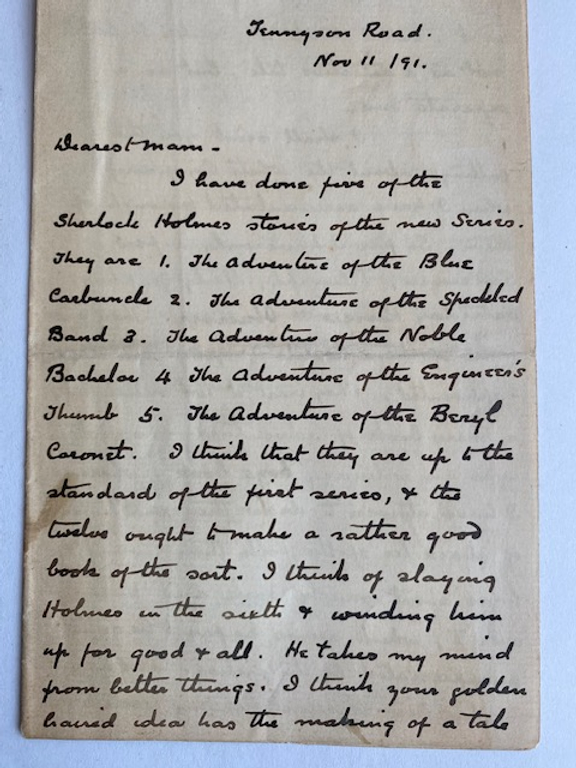Why Does It Have To Be Original?
An extract taken from “Only Connect’ written by Director of The Conan Doyle Estate and Step Great Grandson of Arthur Conan Doyle - Richard Pooley.
Richard was interviewed by historian Lucy Worsley which features in the three-hour, three-episode BBC television documentary on Arthur Conan Doyle, creator of Sherlock Holmes. ‘Killing Sherlock’.
“Is it original?” the member of the film crew asked me.
“Yes. It’s a letter he wrote to his mother. One of about a thousand that still exist. He wrote to her from his schooldays until her death. As you can see, he called her ‘Mam’. This one is unusual; he’s written the date: ‘Nov 11 /91’. Very few of his letters to her have a date. Must be a nightmare for his biographers. And the punctuation is almost all correct. That’s unusual too; for a writer he was pretty cavalier with his punctuation. And his spelling.”
“Beautiful handwriting. And so easy to read.”
“Yes, and no crossing-outs. In all the letters he wrote … thousands to all sorts of people...you’ll hardly find any crossing-outs. He had a very ordered mind."
She wasn’t listening to my wittering. “Can I pick it up?”
“Sure”
She slid her hand under the little letter and lifted it off the table. She placed a finger against the top of the brown-yellowed paper, presumably so as not to touch any ink, and deftly turned over the first page to look at the next two.
The content of the first page had not seemed to interest her, even though it contained a line which still shocks me however many times I read it. It was the same with the other pages. She scanned them swiftly, whispered a quiet “Wow!” and let the letter slip off her palm on to the table. Her reverence for this piece of paper was palpable.
We were in a Victorian-era country house hotel on the edge of the New Forest in England. I was about to be interviewed by historian Lucy Worsley for a three-hour, three-episode BBC television documentary on Arthur Conan Doyle, creator of Sherlock Holmes.*
The producer wanted me to talk about Doyle’s relationship with his mother, Mary, focusing on the letters about his Sherlock Holmes stories that he wrote to her between October 1891 and April 1893. Even though “A Scandal in Bohemia”, the first of these stories, had, unlike two previous Holmes novels, brought him instant fame and much-needed fortune in July 1891, he was telling her just three months later that: “I think of slaying Holmes...& winding him up for good & all. He takes my mind from better things.”
On 6 January 1892 he wrote: “So now a long farewell to Sherlock...He still lives however, thanks to your entreaties.” Clearly, she had kept begging him not to kill off Holmes. She must have seen what her son could not: that he had created someone and something totally new and fascinating. So much more enthralling to Victorian readers than his painstakingly-researched historical novels. We don’t know exactly what her arguments were (though we can be sure that one was financial); whilst she kept all his letters to her, he only kept a few from her to him. It is largely thanks to her “entreaties” that it took almost another two years and twelve more Holmes stories before Doyle sent Holmes and his nemesis, Professor Moriarty, plummeting to their (apparent) deaths at the Reichenbach Falls in “The Final Problem.”
But none of that seemed to have been of great interest to the member of the film crew. I am sure she appreciated that the letter’s contents made it both financially and historically valuable. But her reverential “Wow!” came from somewhere else.
Why do we so value, worship even, the original? The BBC producer had insisted that Worsley and I have Doyle’s original letters in front of us; that I read from the originals or handed them over for her to read. You don’t need to have the original in your hands to make the same observations I made to Worsley and to the member of her film crew. A good copy would have sufficed. It’s true that it makes a difference when you can see how someone writes. You don’t need to be a graphologist to make a few shrewd guesses about the writer’s personality. But you don’t have to see the original to make those guesses…
Read the full article HERE

